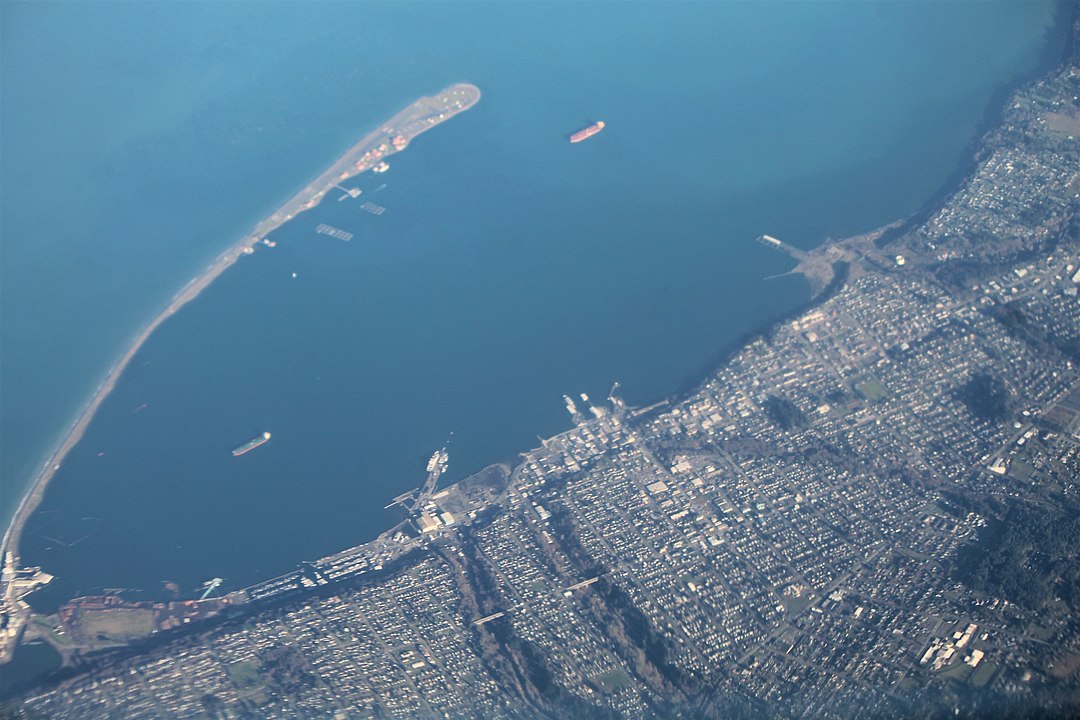Alongside the larger communities of Seattle, Tacoma, Spokane, and Vancouver, Port Angeles boasts a vibrant story. The Native history of Port Angeles is replete with salmon fishing, whaling, competition with Alaskan peoples, and a profusion of legends. Colliding with the ancient stories are the written details left by Euro-Americans, generating a mix of themes and human contributions.
Flag-bearers of Tsarist Russia, while exploring and taking sea otters, encountered Spanish ships from California. One of the Iberian sailors was named Francisco de Eliza. In 1791 Eliza named an Olympic Peninsula harbor under the shadow of great mountains recently named Porto de Nuestra Senora de Los Angeles – Port of our Lady of Angels.
The next year Spanish Lieutenants Galiana and Valdez, aboard their ships “Mexicana” and “Sitil,” took a second look at this harbor protected by large sand spit. They shortened its name to Porto de Los Angeles, or Port of Angels. English captain George Vancouver, who had met Galiano and Valdez in these waters in 1792, wrote “Port Angeles” on his maps. Vancouver’s charts and logs reached Europe and received wide notoriety.
Despite the fact that Vancouver dubbed the name Port Angeles, he actually did not examine the harbor very closely. Fifty-three years later his fellow countryman, Captain Henry Kellett, spotted and named the three-mile-long Ediz Hook which protected the harbor. “Ediz” is a variant of the local Native word “yennis,” which means “good place.” To further confuse matters, the spit was briefly called “False-Dungeness” because sailors often confused it with the real Dungeness Spit 18 miles eastward.
No one has found out why three sea captains in 1856 collaborated in sailing the schooner “Thorndyke” behind Ediz Hook. Captains Alexander Sampson, Rufus Holmes, and William Winsor chose Port Angeles as a fishing and trading site for their new firm, Winsor and Company. Members of the Winsor and Company outfit called their claim the Cherbourg Townsite Company – presumably to attract investors. A respected territorial lawyer handsomely named Selucius Garfielde advised the eager bunch that donation claims were legally to be used for settlement, not speculation. At this point the loose partnership, without explanation, broke up.
The next Port Angeles chapter was equally interesting. One Victor Smith arrived on the beach. He had been virtually run out of neighboring Port Townsend and in retaliation Smith was seeking a location to move the Port Townsend Custom House. After buying an interest in the old Cherbourg Townsite Company, he wrote a letter to U.S. Secretary of the Treasury Salmon P. Chase, followed by a personal visit to Washington, D. C.
The curious result of these shenanigans was that on June 19, 1861 President Abraham Lincoln signed an act establishing five square miles of what today includes downtown Port Angeles and its waterfront as a military reserve. Lincoln’s signature was affixed only weeks after the first skirmishes of the American Civil War. One could surmise that either Victor Smith was a super salesman or the President was super distracted. Some historians have speculated that Lincoln actually had in mind a West Coast additional national capital city for Port Angeles.
In 1862 Smith victoriously moved the Customs House to Port Angeles. The second “National City” in the United States – after Washington, D. C. of course – was thereby established. Victor Smith saw an opportunity to make a fortune. His dream ended, however, when a flash flood roared down the Valley Creek Gulch, taking out the Customs House and several businesses and washing away possessions in Smith’s house.
Two years later the dream of a “National City” in Port Angeles vanished with Victor Smith’s death by drowning. The colorful history of the Port of our Lady of Angels, or Cherbourg, or False Dungeness, began and continues at the water’s edge.
Discover more from Post Alley
Subscribe to get the latest posts sent to your email.

How about a passenger-only ferry that goes from Port Angeles, via Port Townsend, to Seattle? Port Angeles could be a hub city, with ferry connections to Victoria and as a gateway to the wonders of Olympic National Park.
-A fascinating read, Junius. I enjoyed learning all the little details about Port Angeles I didn’t know, despite having visited there numerous times. Thanks for sharing.
Wonderful! I’m changing my name to Selucius.
Curious about sailors confusing the hook and the spit. One is a great harbor, the other is not. Was it always this way?